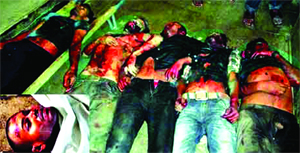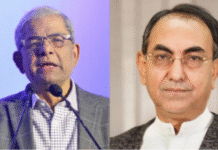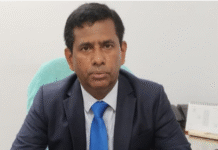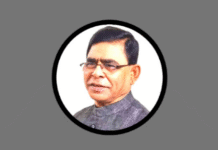Sadeq Khan
Prime Minister Sheikh Hasina starting with Amendment of the Constitution suiting her needs to retrospective application of a hurriedly has been adept at randomly using the judiciary for political purpose, passed law only to “hang” a Jamaat-e Islami leader altering the final judgment of life sentence pronounced by the Tribunal on “war crimes.” On March 5, she told her parliament that top leaders of BNP and Jamaat-e Islami would be tried and punished for mayhem in the name of movement “killing people and destroying public and private property” for boycott of January 5 elections.
The leader of the boycotting alliance, BNP Chairperson Khaleda Zia told journalists on the same day that Sheikh Hasina’s government had lost legitimacy, and was getting away with abuse of force for “many illegal things”, for which the government leaders will be brought to book and held answerable. Both BNP and Jamaat have of late been vociferous about their party leaders and workers being systematically “abducted and killed” by security agencies or hirelings of the government under a covert blueprint to “annihilate” the opposition and consolidate the virtual “one-party system” of the present government set up.
Killings on the rise
Indeed, press reports of extrajudicial killing have been on the rise with an average of one person killed every day after the Awami League-led alliance assumed power for the second term by sham January 5 general elections boycotted by all opposition parties.
According to the data of human rights watchdog Ain o Salish Kendra, 49 people were killed by law enforcement agencies in the first two months of 2014. In the latest incident, a regional leader of the Purba Banglar Communist Party was killed at Damurhuda upazila in Chuadanga in a ‘gunfight’ during a joint operation of the Rapid Action Battalion and the police on March 5.
Before that in this month again, three more people were killed on March 3 in reported incidents of ‘gunfight’ at Kadamtali in broad daylight in Dhaka city itself, and at Savar in the outskirts of the capital, sending alarm bells amongst the city dwellers about public safety. Two killed by the Rapid Action Battalion in a house at Kadamtali was an occurrence in the afternoon. The other was killed by the police on Dhaka-Aricha highway at Savar early in the morning. The Battalion claimed that two abduction case suspects, Mohammad and Sangram were killed in a ‘gunfight’ that afternoon. The Battalion’s team raided the house at Kadamtali purportedly to rescue some ‘kidnapped’ people.
At a briefing, RAB-10 commanding officer said that they rescued four abducted people, from the house. Two of the kidnappers managed to get away. One of the ‘rescued’ persons, Jonny, said that he was abducted on Sunday from Signboard area in Narayanganj and the gang demanded Tk one lakh. Mohammad’s son Ali Hossain denied the allegation saying that his father was a businessman of CNG-run auto-rickshaws and the Battalion personnel shot him from close distance for no offense.
Robbery suspects & ‘gunfight’
In the other incident, the police claimed that a robbery suspect was killed in a ‘gunfight’ on Dhaka-Aricha highway. Savar police raided Ramchandrapur area on information that a gang of robbers was preparing for robbery. The ‘gunfight’ took place at about 2:30am when a patrol team saw the gang of 10-12 people sitting on the Dhaka-Aricha highway. The police challenged them, prompting the gunfight. One robbery suspect sustained bullet injuries while his fellows fled the scene. The identity of the man killed, however, could not be established. The police patrol team leader also sustained injuries during the incident and was now undergoing hospital treatment.
Of the 49 killed extrajudicially in January and February, 2014, the most mysterious case was that of an escaped death row convict, killed in ‘gunfight’ hours after recapture by police in Tangail on February 24. Within 19 hours after his escape attempt, JMB militant Rakib Hasan Russell was killed in “crossfire”. He was one of the three top Jama’atul Mujahideen Bangladesh men who were snatched from police custody in a Hollywood-style ambush on the highway on Feb 23 morning. He was captured five hours later when his getaway car crashed.
Some journalists drew the attention of Deputy Inspector General of Police about Rakib’s mother crying and complaining that her son would be killed. “We will do everything for his security,” the IGP had told journalists that evening at Sakhipur Police Station in Tangail, hours before Rakib was actually killed. No journalist was allowed to talk to Rakib. Detective Branch of police and other law enforcement agencies had interrogated Rakib at Sakhipur Police Station for about 14 hours. Sakhipur police claimed he was taken to Beltoli Ceramics area in Mirzapur upazila around 4:30am, Feb. 24 “to arrest other JMB militants.”
HR violations & ‘zero tolerance’
One may compare these high figures of extrajudicial killings in 2 months and a week with the figures in the first nine months of 2013, and of the year 2012 as given in the Country Reports on Human Rights Practices for 2013, Bangladesh, released on March 1 by US Secretary of State John Kerry on March 1 in Washington. The report identified regular violations of human rights in Bangladesh by way of extrajudicial killings, arbitrary detentions, weak judicial capacity, and lengthy pretrial detentions. Authorities infringed on citizens’ privacy rights. Politically motivated violence and pervasive official corruption remained serious problems.
The report put on top of the list of human rights violations in Bangladesh the matter of Arbitrary or Unlawful Deprivation of Life. It read: “The constitution provides for the rights to life and personal liberty; however, the media and local and international human rights organizations reported that the government or its agents committed arbitrary or unlawful killings. The government neither released statistics on total killings by security personnel nor took comprehensive measures to investigate cases, despite previous statements by high-ranking officials that the government would show zero tolerance and fully investigate all extrajudicial killings by security forces.
According to the media and local human rights organizations, no case resulted in criminal punishment during the year and, in the few instances in which the government brought charges, those found guilty generally received only administrative punishment. Some members of the security forces acted with impunity. The government formed an internal inquiries cell within the paramilitary Rapid Action Battalion (RAB) to investigate cases of human rights abuses, but during the year there was no information disclosed on any prosecutions for suspected killings by RAB officers.
Extra judicial killings
The legal aid and human rights NGO Ain o Salish Kendra (ASK) reported that during the first nine months of the year, security forces, including the RAB, committed an estimated total of 146 killings. The deaths occurred during raids, arrests, and other law-enforcement operations. The government often described these deaths as “crossfire killings,” “gunfights,” or “encounter killings,” terms used to characterize exchanges of gunfire between RAB or police units and criminal gangs. Throughout 2012 there were an estimated 70 extrajudicial killings.”
On February 4, British lawyer Toby Cadman had filed a request on behalf of the International Coalition for Freedoms of Rights urging the International Criminal Court in The Hague, Netherlands, to investigate the government of Bangladesh for alleged crimes against humanity in persecuting its political foes.
The International Coalition for Freedoms of Rights was formed in Istanbul, Turkey, last year after the military coup that removed Egypt’s former Islamist President Mohammed Morsi from office. The organization is closely associated with Islamist legal efforts to prosecute the coup leaders in Egypt. It has now turned its attention on Bangladesh.
International Criminal Court prosecutor Fatou Bensouda will decide whether the government abuses have been systematic enough to rise to the level of “crimes against humanity,” and necessitate an investigation. Cadman’s office identified specific alleged instances of government forces shooting, detaining and torturing civilian protesters.
“It is clear that since the current Awami League government first came to power in 2009 there have been hundreds of deaths,” caused by government forces, the filing said. “Numbers are difficult to quantify due to the absence of credible investigations and the inability of the media and international nongovernmental organizations to properly document crimes.”
A Damocles’ sword of censure, if not prosecution, may thus be hanging on the head of government leaders and functionaries of the nation-state for “crossfire” culture.
Source: Weekly Holiday










